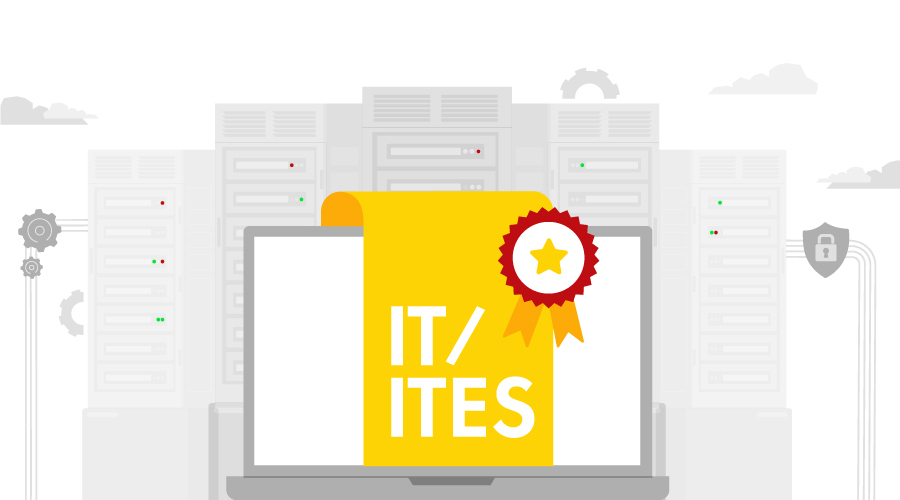
What are the Certifications for IT/ITES Organisations? What are their benefits?
11th Jun, 2021
The world is constantly inching towards rapid technological innovations and witnessing dynamic changes in economic and business conditions. With the proliferation of the internet and globalization, opportunities have no boundaries.
The Information Technology (IT) sector plays a vital role in almost everything we do today. Hence, IT and ITES industries must ensure that it matches the efficiency and customer satisfaction in the ever-growing market. Being an IT and ITES organisation can lead to encountering various risks and challenges in their journey to maintain a successful, sustainable, and efficient business.
Be it a small or big IT/ ITES organisation, one must consider having a certification as it has numerous benefits as mentioned below.
Making a Mark in the Global Market
The information security standards are globally recognized and companies all over the world map implement and adhere to them. Hence, getting certified with the international standard can help you get new international clients and business partners, that trust your risk management expertise.
Meeting Security Audit Requirements
When organisations are certified with ISO standards, it demonstrates that they are adhering to the universally accepted practices, leading to reduced numbers of stakeholders and clients requesting security audits. This, in turn, saves a lot of organisation’s crucial time and paperwork.
Meeting Compliance Requirements
There are various compliance requirements related to the information security and management systems such as contractual, legal, and regulatory. With ISO certification an organization can easily achieve and maintain compliance.
Minimizing the Chances of Data Breach
It is very important to protect your data in the present times. The failure to do so can lead to serious consequences such as fines due to non-compliance and can even damage your organisation’s reputation. Thus, implementing the international standard can minimize the chances of data breaches.
Here are the five most relevant standards that you can incorporate into your organization.
1. ISO 27001 – Information Security Management System
ISO 27001 is an international standard that offers specifications or a prescription to the organization on how to manage and protect their information asset, remain safe and secure. It specifies the requirements for establishing, implementing, operating, monitoring, reviewing, maintaining, and improving a documented Information Security Management System (ISMS) within the context of the organization’s overall business risks. The certification of ISO 27001 can also help build trust among the clients and stakeholders.
By implementing ISO 27001 you can observe many benefits, some of which include:
- Builds confidence among customers and stakeholders regarding your risk management
- Protects confidential information
- Enables for secure exchange of information
- Helps you to comply with other regulations
- Gives the organization a competitive edge
- Minimizes the risk exposure
- Establishes a culture of security
- Secures the company, assets, shareholders, and directors.
2. ISO 20000– IT Service Management
ISO 20000 is an IT service management system. It enables the IT organizations to ensure that their processes are aligned with both the needs of the organizations and international best practices. It defines a comprehensive and closely related set of service management processes and comprises two parts: Part 1 lays out the specifications for the services management systems whereas Part 2 is the code of practice for service management, which describes the best practices for service management processes within the scope of the specification.
Some of the most common benefits of ISO 20000 certification are:
- It is fully compatible with the IT infrastructure library
- Helps IT service providers become more responsive
- The certification acts as a differentiator in the competitive market and helps gain new business by exhibiting reliability and quality service
- Strengthens the client’s trust and assures them that their requirements will be effectively achieved.
- Gives you the ability to select and manage external service providers more efficiently
- Regular certification audits enable the service providers to monitor, measure and review their service management processes
- Reduces the cost of accordance to other laws and standards.
3. Capability Maturity Model Integration (CMMI)
The Capability Maturity Model Integration (CMMI) is a process improvement model that provides a set of industry-recognized practices to address productivity, performance, costs, and stakeholder satisfaction. It is used to guide process improvement across projects, departments, and entire organizations. It helps organizations examine the effectiveness of their processes, establishes priorities for improvement, and in implementing appropriate improvements.
There is the concept of appraisal in CMMI. It can be awarded a maturity level rating (1-5) or a capability level achievement profile. CMMI’s five Maturity Levels are:
- Initial
- Managed
- Defined
- Quantitatively Managed
- Optimizing
A few of the CMMI implementation benefits are:
- Explicitly links the management and engineering activities to the business objectives
- Expands the visibility into the product life cycle and engineering activities to ensure that the products and services meet customer expectations
- Incorporates lessons learned from additional areas of best practice (e.g., measurement and risk management)
- Implements more robust high-maturity practices
- Addresses additional organizational functions critical to their products and services
- Complies with relevant ISO standards
4. ISO 22301- Business Continuity Management System
ISO 22301 is the recognized international standard that provides organization requirements to form a potent Business Continuity Management System. In times where there is the constant threat of cyber-attacks, natural calamities, and data breaches that can hamper business continuity as well as damage their reputation, it is of crucial importance that businesses implement, maintain, review and revise their business continuity management system. The standard helps to identify the potential risks and allows businesses to efficaciously respond and recover from the incident with minimum damage.
There are many unique benefits of ISO 22301, some of which are as follows:
- Protects assets, turnover, and profits
- Ensures the ability to continue business with maximum output/results despite the disruptions
- Prevents colossal damage
- Conducts an independent assessment of your security
- Helps gain competitive advantage
- Improves operations, supply chain, and information resilience
- Establishes robust response and recovery procedures
- Reduces dependence on individuals
- Enhances corporate reputation
- Abides by the legal and regulatory requirements
5. ISO 31000 – Risk Management System
ISO 31000 is the international standard that provides guidelines for the risk management system. The standard can be applied to any company irrespective of its size or industry. The standard helps the business achieve its objectives and analyses what can go in favour or against it. It also protects businesses from external and internal risks.
Some of the benefits of ISO 31000 are:
- The framework is systematic, structured, and timely
- Improves operational efficiency and governance
- Increases the stakeholder’s confidence in your risk management expertise
- Responds to change and protects your business as it flourishes
- Enhances business performance, crisis management, and organizational skills.
The 4C Roadmap to Excellence
With unmatched expertise in the industry and an analytical approach, we drive to yield the best solutions for your organization with a promise of long-term profit.
- Gap Analysis
We identify the organization’s strength and current status; understand the gap in line with the required standard for respective departments, processes and personnel, and accordingly, formulate the Growth plan. - Awareness Training
Awareness Training modules are custom designed for APEX Committee and Core Team which covers the standard overview, the roadmap for certification and observations and examples gathered from the gap analysis - Documentation
We prepare the Management System Documentation as per the requirements of ISO and Management System Standards after taking due consideration of the Gap Analysis results. - Implementation and Monitoring
Function specific guidance and periodic monitoring to implement the Documented System. - Internal Auditor Training
Train and Lead Cross Functional Internal Audit Team to effectively audit implemented system. - Management Review
Assist Top Management to review the effectiveness of the implemented system, internal audit results, Management System Policy, Objectives and Targets. - Registration Audit
Coordination with certification agency for audits and up-gradation of systems till certification. - System Value Management
Periodic monitoring, review, training and up-gradation of Management system to sustain & improve effectiveness, Planned internal audit to measure effectiveness & assistance in surveillance audit.
4C Consulting team of experts has empowered 40+ Clients with IT/ ITES certification consulting, training, and implementation to secure their business from threats and reach greater heights. With 800+ hours of training and 70+ IT/ITES certifications, we have helped clients gain international recognition, credibility, and trust from customers. To know which IT/ITES certifications are most suitable to your business objectives and goals, reach out to our consultants now.
